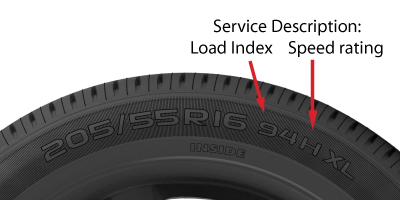Last Updated on September 9, 2024
Your Guide to a Smoother Online Tire Shopping Experience
Tires are not something we have to think about very often. Every three years or so, we might feel the car slipping a little more than usual, or during a routine service check, our mechanic tells us that we are due for new tires. But this does not mean we should stay in the dark and at the mercy of an unscrupulous tire salesperson. Here are the five things you need to know when buying tires online to make the right decision without ever stepping foot in a tire shop.
1. When to buy
This depends on how much tread is left on your tires and your future tire strategy. If the tires still have more than 4/32nds of an inch of tread life, and you live in a northern state, those tires may be fine for summer driving. You could wait until late fall and change those tires out for a set of winter tires. The partially worn tires could then be used next summer.
Alternatively, If the tires are completely worn to 2/32nds, and you notice degraded grip and poor ride quality, changing your tires out sooner for an all-season tire could be the best solution. You can quickly check if your tires are ready to be changed by measuring the tread depth with a penny. If you can see all of Lincoln’s head, it is time to start researching and comparing tire prices!

2. Quantity of tires to replace
While tire manufacturers recommend that you change out all four tires simultaneously, this is not always the most practical solution. If you have not rotated your tires, the front tires may be worn much faster than the rear tires. If one pair of tires still has over 50% of the original tread left, replacing only two tires with an exact match of tire brand and style is a good option.
If this is your situation, and you are buying tires online as a pair to replace the most worn tires, the new tires must go on the rear of the vehicle. Buying tires online is significant for safety, particularly in areas with frequent rain and slippery roads.
Buying tires online two at a time should allow you to get at least another year out of the half-worn tires, with enough traction to get you safely through the winter months. This approach also extends the useful life of the two best tires in the vehicle and allows you to stagger your new tire expenditure.
3. Know Your Tire Size and Type
Before you start shopping online, knowing the correct tire size and type for your vehicle is crucial. You can find this information in your vehicle’s owner’s manual or on the sidewall of your current tires. Getting the right size and type ensures optimal performance and safety.
Type of tires
If you are changing out all four tires, and there is enough tread to wait until the fall safely, you can buy all-season, summer, or winter tires. Summer tires are the best option if you only experience wet and dry roads year-round, like in the southern states.
In the heat and on wet roads, summer tires typically give you the best handling, comfort, and the least amount of noise generated by the tread at high speeds. In the northern states and Canada, the choice between all-season and winter tires should be based on the winter temperature range in your area. If regularly below 40 degrees Fahrenheit, winter tires will provide more grip on cold, dry roads.
Some areas are mild most of the time but occasionally get heavy snowfall, frost, and icy roads in the morning. Winter tires are a better option if you have to drive in these conditions. Don’t forget that if you opt for winter tires instead of all-season or summer tires, you need a place to store your other set!
This may not be possible if you don’t have inside storage space. Last, you should know state or provincial laws about winter tire usage. Some jurisdictions now require designated winter tires during the winter months.

Tire size
With tires, size is more than just the dimensions of the tire. You also have to know the speed rating and the load range. In the case of passenger car tires, the speed rating and load are paired together and molded right on the side of the tire beside the size.
It is an alpha-numeric pairing like 94H or 102T. You always want to ensure that the speed rating and load range of your replacement tires are equal to, or greater than, the tires specified for the vehicle and indicated on the sticker inside the driver’s side door.
4. Research Tire Brands and Models
There is a vast difference in what you can spend when buying tires online. Prices vary significantly according to the type of vehicle and the size. For example, a BFGoodrich Mud-Terrain T/A KM2 tire for a 20-inch rim on a lifted pickup truck could cost over $700 for one tire.
A 15-inch tire for an economy sedan in a value brand like the Antares Grip 20 would cost $50 – $60 per tire. Even within the same size, the spread in price can be as large as 100%. This is due to factors like the brand name, the associated features and benefits, and even the country of manufacture.
Your tire budget
With numerous tire brands and models available online, it’s a good idea to research. Read reviews, compare specifications, and consider your driving needs. Are you looking for all-season, winter, or performance tires? Understanding your requirements will help you narrow down your options.
A few minutes of online research to see typical prices for your specific tire size will help manage your expectations and set your budget. This will likely determine if you will end up with a premium name brand with an extended mileage warranty or if you are better suited to a cheaper tire made in China.
Check for Deals and Promotions
In today’s digital age, buying tires online has become a convenient and accessible option. With just a few clicks, you can browse a wide range of tire brands and models, compare prices, and deliver your tires right to your doorstep. However, before you hit that “buy” button, you should know some essential things to make your online tire shopping experience smooth and successful.
Online tire retailers often offer special deals, discounts, and promotions. Keep an eye out for these to maximize your savings. Some websites may also provide free shipping or installation services, so take advantage of such offers.
5. Verify Seller Reputation
Choose a reputable online tire seller. Look for customer reviews, ratings, and feedback about their products and services. A trustworthy seller will have a history of satisfied customers and transparent policies.
Check Warranty and Return Policies
Review the warranty and return policies of the tires you intend to purchase. This information is crucial in case you encounter any issues or need to make a return or exchange. Ensure you understand the terms and conditions.
Installation and Maintenance
Consider how you’ll get your new tires installed. Some online sellers have partnerships with local shops or offer installation services themselves. Also, remember that proper tire maintenance is essential for longevity and performance. Regularly check tire pressure, rotate your tires, and schedule alignments as needed.
Review Shipping and Delivery Times
Be aware of shipping and delivery times, especially if you need your tires by a specific date. Some online retailers offer expedited shipping options, while others may take longer.
Conclusion
Buying tires online can be a convenient and cost-effective way to ensure your vehicle’s safety and performance. You’ll confidently navigate the online tire market by following these essential tips. Remember that proper research and preparation are crucial to choosing the right tire for your needs and enjoying a smooth online shopping experience. Get ready to hit the road with the perfect set of tires for your vehicle!
FAQs
What factors should be considered when purchasing tires?
When buying tires, consider factors like tire size, type (e.g., all-season, winter), tread pattern, brand reputation, and your specific driving needs to make an informed choice.
What questions to ask when buying tires?
Ask about tire size compatibility, tread life, warranty coverage, and whether installation services are available. Also, inquire about any ongoing promotions or discounts.
Is it wise to buy tires online?
Buying tires online can be wise due to convenience, competitive prices, and a wide selection. Ensure you research the seller and understand their return and warranty policies.
What are the benefits of buying tires online?
Online tire shopping offers convenience, a broader range of options, potential cost savings, and the ability to quickly research and compare products and prices. Many online retailers also provide delivery or installation services for added convenience.
-
Proofreader











